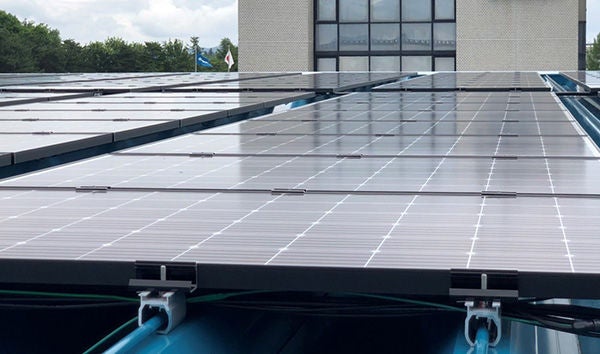Reducing carbon dioxide emissions is essential to tackling global warming and contributing to a sustainable world. We understand that we are responsible for the environment, and work to monitor the carbon footprint of our business activities and promote tangible initiatives to stop global warming.
We have set medium- to long-term targets with the aim of halving groupwide Scope 1 and 2 emissions from FY 2019 levels by FY 2030.
Greenhouse Gas Emissions
The base year has been set as FY 2019 (previously FY 2016 for Scope 1 and 2 emissions and FY 2021 for Scope 3 emissions) because it is the earliest year with complete and verifiable data that reflects the company's typical emission profile.
Medium- to long-term targets and their progress
SATO's targets and progress for carbon dioxide emission reduction
| Area | Key indicators | FY 2019 results | FY 2022 results | FY 2023 results | FY 2024 results | FY 2030 targets |
|---|---|---|---|---|---|---|
| Groupwide | Scope 1 and 2 CO2 emissions | 14,019 | 10,592 | 14,061 | 11,404 | 7,010 |
| Relative to FY 2019 | - | Down 24.4% | Up 0.3% | Down 18.7% | Cut by 50% | |
| Japan | Scope 3 CO2 emissions | 317,836 | 321,951 | 324,463 | 329,219 | 222,485 |
| Relative to FY 2019 | - | Up 1.3% | Up 2.1% | Up 3.6% | Cut by 30% |
FY 2024 recap
In FY 2024, we reduced groupwide Scope 1 and 2 emissions by about 19 percent year on year as we pushed for more renewable energy at our key printer factories overseas and business sites in Japan. Our Scope 2 emissions are lower also because our Japan factory resumed using carbon-free electricity. The factory had been relying on conventional energy sources in FY 2023 due to the closure of its renewable power provider.
Action plans
In FY 2024, we converted several key printer factories and business sites to solar power. Looking ahead, there are other SATO sites we can transition to renewable energy to help significantly reduce our overall energy consumption and Scope 1 and 2 emissions. These are a top priority from FY 2025 and beyond.
Data shows that emissions associated with purchased goods and services (Category 1), use of sold products (Category 11) and end-of-life treatment of sold products (Category 12) account for the bulk of our Scope 3 emissions. We will use EPD (Environmental Product Declaration) results to improve transparency about the environmental impact of our key products over their life cycle and make stronger efforts to cut their emissions quantitatively.
We will also continue to expand our printer take-back program and recycling of used ink ribbons and discarded label liners while developing and offering solutions that help customers reduce emissions in their operations and contribute to a circular society.
Energy self-sufficiency via solar panels
In 2018, SATO joined Japan Climate Leaders' Partnership (JCLP) as a supporting member to help tackle climate change by reducing CO2 emissions. JCLP is a group of Japanese companies sharing the common understanding that the industrial sector should take actions to realize a sustainable, decarbonized society with a sense of urgency. Through JCLP, we were able to link up with a photovoltaic system provider (also a supporting member) to install solar panels at our Japan factory. Beginning operation in September 2020, this solar power system is expected to generate about 220,000 kWh of electricity per year to reduce emissions by about 115 metric tons annually.

Renewable energy sources
In October 2020, we contracted a renewable power provider for the Japan factory where we develop and manufacture specialty barcode printers and manufacture labels and stickers. This helps the factory further cut its CO₂ emissions by about 1,214 metric tons annually and achieve 100 percent renewable energy (net-zero emissions after carbon credits and other adjustments are taken into account). Our next step is to get other SATO sites to switch to renewable energy sources as well.
LED lighting for logistics centers
In 2019 we began installing energy efficient LEDs at our two logistics centers in Japan (Saitama and Nara) which was completed in February 2021. This translates to an emissions reduction of about 86 metric tons annually.
100 percent renewable energy for hardware factories
From October 2024, we transitioned our Vietnam factory to renewable energy via International Renewable Energy Certificates (I-RECs)*1 to reduce our carbon footprint. As one of our main plants for producing printers and hand labelers, the Vietnam factory uses approximately 1,228 MWh2 of electricity annually, which will now be fully sourced from renewable energy.
In March 2025, we launched the same initiative at our printer factory in Malaysia, which consumes approximately 2,096 MWh*2 of electricity annually.
Through these efforts, we expect to run our key hardware factories entirely on renewable energy, reducing carbon emissions by about 2,143 tons per year.
1. Certificates used in more than 60 countries in Asia and Africa to document the attributes of electricity generated from solar, wind, hydro and other renewable energy sources. By purchasing and redeeming I-RECs, businesses can claim the environmental benefits of the generated clean energy.
2. Based on actual electricity consumption data for FY 2023.
